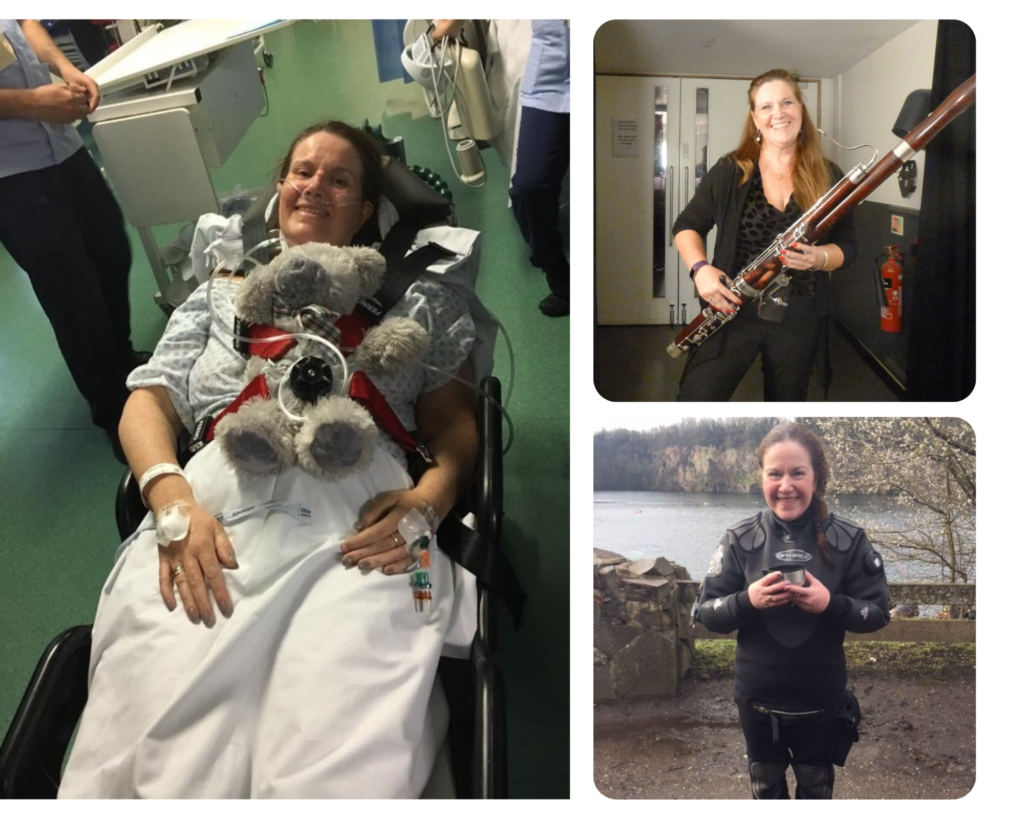News Hub
Musician who ‘technically died’ reflects on lifesaving air ambulance flight

Five years ago, on 30 March, professional musician Jane Gaskell was found lying face down and unconscious in the water during a diving training course at Stoney Cove Dive Centre in Leicestershire. “I was technically dead when they pulled me out,” she says.
But amazingly, the circumstances that surround what she describes as “the incident” meant that she survived and has made a full recovery – thanks, in no small part, to Derbyshire, Leicestershire & Rutland Air Ambulance.
Up until the Covid-19 pandemic had such a devasting effect on the arts, Jane has been busy playing the bassoon with the BBC Concert Orchestra around Europe, on the radio, and at events including The Proms.
She is an active supporter of the local air ambulance and credits the speed with which she was taken to hospital by helicopter as crucial to her being alive today.
“It sounds strange, but I was in the right place at the right time. Staff at the diving centre are all first aid trained and there is a defibrillator on site. The air ambulance attended and I was flown to hospital in five minutes,” she says.
Jane was on the second day of open water diving training when her heart stopped as she made her ascent from a 12-metre dive.
Unbeknown to her at the time, she had a virus which attacked her heart. “I must emphasise it was bad luck and absolutely nothing to do with diving,” she says.
As soon as she was out of the water, fellow divers and Stoney Cove crew started to give her CPR. This was carried on by paramedics and the air ambulance critical care crew for a total of 23 minutes and the defibrillator was used seven times to get her heart beating again.
The speedy air transfer to Leicester Royal Infirmary – which would have taken over 20 minutes by road – meant that she got the urgent care she needed as quickly as possible.
After four days lying unconscious in the intensive care unit, Jane woke up and to the great relief of her family, who had been on a bedside vigil since her arrival at the hospital, she immediately laughed at a joke.
Doctors had warned her parents beforehand that they couldn’t predict what Jane’s condition would be when, or even if, she regained consciousness and whether she would be able to play an instrument again.
“It’s a miracle that I survived. To have technically died and lived to tell the tale and return to work is incredibly lucky. It’s made me appreciate life more and live for the day,” she says.
In total Jane spent three weeks in hospital, transferring to Leicester General before returning to her home in Preston Bissett near Buckingham.
She says: “The local air ambulance receives no government funding and relies totally on donations and fundraising to remain operational. I have agreed to share my story to help raise awareness of the lifesaving work they do and to encourage people to support the charity as much as they can.”
“I am sure that it never occurs to many people just how fortunate we are to have the local air ambulance available to help us in times of crisis. I know from personal experience that, although I was aware of the charity, I never imagined I would need to call upon it.”

The charity needs the public’s support now more than ever as it recently launched two brand-new state-of-the-art replacement aircraft to continue getting its crew to the scene of an incident to deliver the highest quality of critical care to patients like Jane – and transfer them to hospital as quickly as possible.
